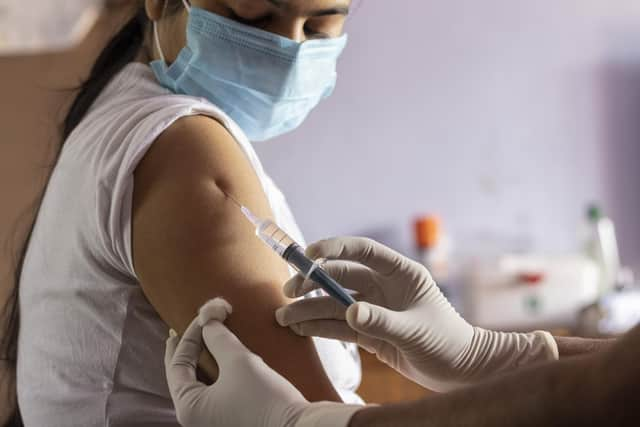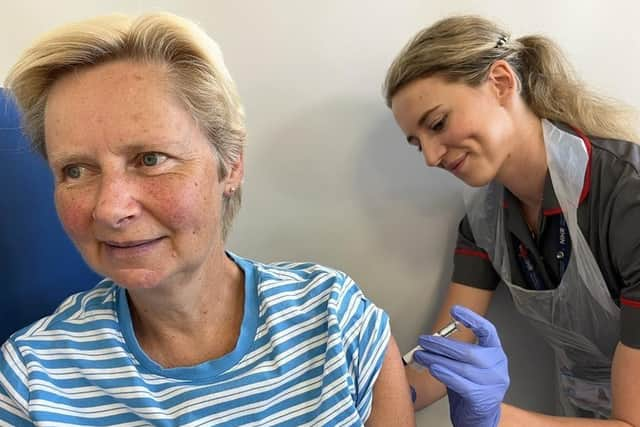Covid vaccine myths, conspiracies and misinformation: Are there real risks or side effects in taking vaccines?
This article contains affiliate links. We may earn a small commission on items purchased through this article, but that does not affect our editorial judgement.
Vaccine scepticism, and the spreading of misinformation surrounding the safety and consequences of vaccination, dates back to the first vaccines in the late 18th century. Science has come a long way since then, but conspiracy theories remain.
The early principle of vaccination, called variolation, has been around for centuries. Most people with children will be familiar with the principle – that an early, mild infection of a disease when the immune system is strong will lead to antibodies which can fight the infection later in a child’s life.Although less common now, the intentional infection of children with chickenpox - which although uncomfortable, tends to be safe - leads to immunity in adults, who have a much higher fatality rate when contracting chickenpox.
Advertisement
Hide AdAdvertisement
Hide AdIn the late 18th century, Edward Jenner used this principle to intentionally infect people with cowpox, which effectively inoculated them from the much-deadlier smallpox. The number of lives saved by the eradication of smallpox, which the World Health Organisation declared in 1980, is measured in the hundreds of millions.


Nevertheless, Jenner faced contemporaneous opposition to vaccination, namely from those who spread false information the bovine origin of the vaccine would cause people to grow cow features such as horns or udders, and from members of the Church of England, some of whom believed mankind should not interfere with God’s will.
Anti-vaccine conspiracies reached a zenith in the 1990s, when a group led by British anti-vaccination campaigner Andrew Wakefield published a fraudulent study showing a supposed link between the MMR vaccine and autism.
The paper, published in the peer-reviewed medical journal The Lancet, was later found to have several conflicts of interest and falsified data, and was retracted. Mr Wakefield was also removed from the medical register.
But the damage was already done. The myth spread, leading to a reduction in the number of vaccines being received in the UK and Ireland, a greater incidence of measles and mumps, and inevitably deaths and serious permanent injury.


The idea that autism is caused by vaccines has remained, despite multiple large epidemiological studies, undertaken by teams of varying nationalities, showing no link between MMR vaccination and autism. It is still a talking point in US politics.
The explosion of anti-vaccination campaigns in the US, and to a lesser extent the UK and Ireland, arguably laid the groundwork for the vaccine scepticism that was to become apparent during the coronavirus pandemic.
Safety trials
One of the biggest concerns lay people express regarding the Covid-19 vaccine is the speed at which the vaccine was produced. There are two strands to this – how quickly new vaccine technology was developed, and how quickly those vaccines were tested in safety trials – a process that usually takes years.
Advertisement
Hide AdAdvertisement
Hide AdTo answer these questions, The Scotsman spoke to Professor Neil Mabbott, chair of immunopathology at the University of Edinburgh. He said the technology used for producing the Covid-19 vaccines had been around for years prior to the pandemic.
“People assume we started from square one, from complete scratch,” said Prof Mabbott.
“In both the Oxford-AstraZeneca [which is a viral vector vaccine] and mRNA vaccines, they were worked on by the research teams who were involved for many years before that. As soon as the genetic sequencing of Covid-19 was released, they could identify which parts to attack, and change the formula quite quickly.”
On the length of the safety trials, Prof Mabbott said the idea that corners were cut is “absolute nonsense”.
Usually, safety testing is slowed down by funding, bureaucratic approval and finding test subjects. However, in the case of the Covid-19 vaccine trials, there was essentially limitless funding, government scientific agencies from around the globe poised to greenlight safety testing, and no shortage of volunteers.
“That can take many months to get all that in line,” said Prof Mabbott. “And then after you submit your data, that can also take many weeks and months to be reviewed.”
But having the technology already available, and “having all your ducks in line” with regards to funding, assessments and volunteers, explained Prof Mabbott, allowed for a much more “streamlined” process.
Aren’t vaccines full of harmful chemicals?
Some of the ingredients may be toxic in larger amounts, but not in the quantities provided in a vaccine shot, Prof Mabbott said.
Advertisement
Hide AdAdvertisement
Hide AdHe said: “As you can imagine, they have to undergo rigorous safety testing before they can be injected into people's arms, and certainly injected into lots of people's arms before they're given to the general public.
“And for that reason, they are made under very strict conditions to ensure there are as few impurities, toxins, etc, in them as possible, to ensure that they're safe as they possibly can be.
“As for the suggestion that they're full of poisonous chemicals, etc., they aren’t.
“That's not to say there aren't ingredients which are toxic in large amounts. They are medicines at the end of the day.”
Heart disease
An enduring area of concern among the public is the risk of myocarditis – inflammation of the heart muscles – following a vaccine dose. This is a known side effect – albeit a ‘very rare’ one.
A study in the journal Nature Medicine estimated between one and ten extra events of myocarditis in every one million people vaccinated with a first or second dose of a mRNA vaccine.
The most up to date UK data was from November 23 last year, by which time an estimated 64.3 million Covid-19 third doses and booster doses had been administered in the UK.
During this period, for every million doses given of the monovalent Pfizer/BioNTech vaccine, there have been ten reports of myocarditis and six reports of pericarditis (inflammation of the tissue surrounding the heart). There were 14 reports of myocarditis and eight reports of pericarditis for every million doses given of the monovalent Moderna vaccine over the same period.
Advertisement
Hide AdAdvertisement
Hide AdAccording to the British Heart Foundation: “While reports of myocarditis following any Covid-19 vaccine are rare, cases are more common in young males aged 18 to 29 years following the second dose. Most people who have been affected have experienced a mild illness and recovered without medical treatment.”
The risk of myocarditis in people who contract coronavirus is much higher, however. The same study found 40 extra cases for every one million people infected with Covid-19.
“The risk from coronavirus is much higher than the vaccine side effects,” said Prof Mabbott.
Contracting coronavirus is associated in some people with the risk of myocarditis and pericarditis, and the risk of that is higher if you haven't had the vaccine versus if you have.”
Excess deaths
Excess deaths – the number of deaths being recorded above expected levels – are still higher than pre-pandemic, but are slowly decreasing. Some people, particularly on social media, have tried to link these excess deaths to the Covid-19 vaccines, with no direct evidence.
Excess deaths are still occurring due to two reasons – because healthcare systems are still on their knees, and because of the lingering effects of coronavirus infections. Here in Scotland, the NHS is facing a recruitment and retention crisis, just months after the healthcare system was brought to its knees by the worst winter on record.
In January, Dr John-Paul Loughrey, the vice-president of Royal College of Emergency Medicine Scotland (RCEM), estimated 50 deaths a week may be being caused by the crisis north of the border.
Dr Loughrey said: “We have patients in some departments in Scotland waiting, instead of four hours, almost four days at times, we have had recorded long waits of 72 plus hours in some places. And that’s the increased risk of death.”
Advertisement
Hide AdAdvertisement
Hide AdAlthough the situation is improving, there are still vacancies across every profession, and in every health board in the country. Patients who had stayed away from their GPs during the pandemic are now presenting with diseases at much later stages.
A number of studies have also found people are more likely to have heart problems and strokes in the weeks and months after catching Covid-19.
There has been some suggestions, particularly on social media, the long-term effects of the various coronavirus vaccines are to blame for excess deaths caused by cancer. However, according to Prof Mabbott, there is “no credible data” that vaccines are carcinogenic, especially when many of the available vaccines “have been used for decades”.
“In fact the opposite is true,” said Prof Mabbott. “With some vaccines, there is an improvement in anti-cancer immunity.”
“With vaccines as a whole, there is very little suggestion that the worst effects come decades later.
“It’s worth remembering, with cancer, kids are being given a cancer vaccine against HPV. It’s only been used for a few years, but the incidence of cervical cancer in young people has plummeted.
“Vaccines remain a safe and effective way to prevent against disease. The risk of the adverse affects are much higher in infected persons than in vaccinated.”
Comments
Want to join the conversation? Please or to comment on this article.